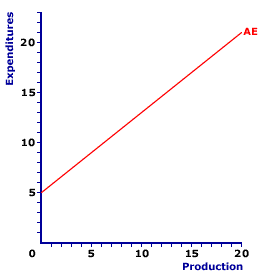
|
|
NOMINAL: The actual dollar price of stuff when it's bought or sold. The contrast is with the term real, which is actual value adjusted for price changes or inflation.
Visit the GLOSS*arama
|
|


|

|
                           INFLATIONARY EXPECTATIONS, AGGREGATE EXPENDITURES DETERMINANT: One of several specific aggregate expenditures determinants assumed constant when the aggregate expenditures line is constructed, and that shifts the aggregate expenditures line when it changes. An increase in inflationary expectations causes an increase (upward shift) of the aggregate expenditures line. A decrease in inflationary expectations causes a decrease (downward shift) of the aggregate expenditures line. Other notable aggregate expenditures determinants include interest rates, federal deficit, consumer confidence, and exchange rates. Inflationary expectations are the expectations that consumers have concerning future inflation. Inflationary expectations work for aggregate expenditures much like buyers' expectations work for market demand. Buyers seek to purchase a good at the lowest possible price. - If buyers expect higher prices in the future, then they increase their demand in the present.
- If buyers expect lower prices in the future, then they decrease their demand in the present.
The relation that exists between price expectations and market demand also applies to inflationary expectations and consumption expenditures.- If consumers expect higher inflation in the future, then they increase consumption expenditures in the present.
- If consumers expect lower inflation in the future, then they decrease consumption expenditures in the present.
In each case, the household sector seek to buy goods at the lowest possible prices.A change in inflationary expectations, by changing consumption expenditures, induces changes in aggregate expenditures. An increase in inflationary expectations increases aggregate expenditures and causes an upward shift of the aggregate expenditures line. A decrease in inflationary expectations then decreases aggregate expenditures and causes a downward shift of the aggregate expenditures line. What It Does| Inflationary Expectations | 
|
The exhibit to the right presents a standard Keynesian economics aggregate expenditures line. Like all aggregate expenditures lines, this one is constructed based on several ceteris paribus aggregate expenditures determinants, such as inflationary expectations. They key question is: What happens to this aggregate expenditures line if inflationary expectations changes?Expecting Higher InflationSuppose, for example, that the inflation rate has been running at a nice constant 2 percent for several years. Households have been able to include this 2 percent inflation rate into their assorted plans (attaining loans, negotiating wage increases, buying cars and houses). They count on 2 percent inflation. Now suppose that irresponsible monetary policy causes an increase in the inflation to 3 percent one year, then to 4 percent the next, the 5 percent the following year, each time catching the household sector, which had been expecting only 2 percent inflation, off guard.The household sector is bound to adjust. Rather than expecting 2 percent inflation, they adjust their expectations upward, perhaps to 5 percent, 6 percent, or even higher. As part of their adjustment, they decide to increase their consumption expenditures, especially for expensive durable goods, rather than waiting. If the price of a house is expected to be higher next year, they decide not to wait, but to buy now. The increase in inflationary expectations causes an increase in consumption expenditures and subsequently an increase aggregate expenditures. To see how a higher inflationary expectations affects the aggregate expenditures line, click the [Higher Expectations] button. The increase in inflationary expectations causes an increase in aggregate expenditures, which is a upward shift of the aggregate expenditures line. Expecting Lower InflationExpectations can, of course, work both ways. Suppose that after years of 5 percent inflation, the inflation rate is brought down to 4 percent, then 3 percent, then 2 percent. While the downward adjustment of inflationary expectations might take longer, the household sector is bound to adjust, eventually. When it does, the household sector is likely to postpone current consumption expenditures, awaiting lower inflation rates expected in the future. The decrease in inflationary expectations causes a decrease in consumption expenditures and subsequently a decrease aggregate expenditures.To see how lower inflationary expectations affects the aggregate expenditures line, click the [Lower Expectations] button. The decrease in inflationary expectations causes a decrease in aggregate expenditures, which is a downward shift of the aggregate expenditures line. What Does It Mean?The importance of the inflationary expectations as an aggregate expenditures determinant was revealed by high and rising inflation rates during the 1970s. Inflation rates continued to rise during this period in spite of contractionary fiscal policies in large part because the public "expected" inflation to rise. Once this relation was uncovered, manipulation of inflationary expectations was used during the 1980s, especially during the contraction of the early 1980s, to reduce inflation and to keep it low throughout the 1990s.

Recommended Citation:INFLATIONARY EXPECTATIONS, AGGREGATE EXPENDITURES DETERMINANT, AmosWEB Encyclonomic WEB*pedia, http://www.AmosWEB.com, AmosWEB LLC, 2000-2024. [Accessed: October 30, 2024].
Check Out These Related Terms... | | | | | | | | | | | |
Or For A Little Background... | | | | | | | | | | | | | |
And For Further Study... | | | | | | | | | | | | | | | |
Search Again?
Back to the WEB*pedia
|



|

|
GREEN LOGIGUIN
[What's This?]
Today, you are likely to spend a great deal of time at a dollar discount store trying to buy either storage boxes for your computer software CDs or a set of tires. Be on the lookout for spoiled cheese hiding under your bed hatching conspiracies against humanity.
Your Complete Scope
This isn't me! What am I?
|

|
|
John Maynard Keynes was born the same year Karl Marx died.
|

|
|
"Anyone who has never made a mistake has never tried anything new. " -- Albert Einstein, physicist
|

|
NYFE
New York Futures Exchange
|

|
|
Tell us what you think about AmosWEB. Like what you see? Have suggestions for improvements? Let us know. Click the User Feedback link.
User Feedback
|


|


